
A precision flight squadron made up of six WW II vintage North American SNJ-2s, the world-famous GEICO Skytypers Air Show Team performs exciting flight maneuvers at many top airshows across the country. One of the most widely recognized airshow teams, the Skytypers have been thrilling crowds for decades, and can often be seen in GEICO commercials with an airsick GEICO gecko flying backseat!
The History
The Skytypers began operation in 1932, when a little-known beverage company hired Andy Stinis (pictured here) to perform skywriting to promote its product. That company was Pepsi-Cola, and for the next 22 years the company used skywriting as its best mass advertising medium. In 1946, Andy developed what he called “skytyping,” a faster, more advanced method of skywriting using multiple aircraft to create more complex displays and messages in the sky. Skytyping produced a high-quality image, with messages that were clearer at long distances and stayed intact much longer. In 1964, Andy was awarded the patent for computer-controlled skytyping between multiple aircraft.
In 1965, Andy’s son Greg moved a fleet of six SNJ-2 aircraft out to California, creating a West Coast Skytyping division. For 10 years, Greg Stinis ran both the East and West divisions, but due to business growth and economics, he focused more on the West Coast. Greg then hired Mort Arken to run the East Coast operation. Arken, a retired U.S. Army and U.S. Navy pilot with 30 years of experience, was a natural showman with extensive sales experience. He teamed up with Greg to deliver Skytyping and aerial formation demonstration flights for a host of clients—among them, Anheuser–Busch, Miller Brewing Company, Coors, Pepsi-Cola, Universal Pictures, Toyota Motors, Disneyland, Coppertone, Solarcane, Ford, and General Foods, to name just a few.
This story is from the {{IssueName}} edition of {{MagazineName}}.
Start your 7-day Magzter GOLD free trial to access thousands of curated premium stories, and 9,000+ magazines and newspapers.
Already a subscriber ? Sign In
This story is from the {{IssueName}} edition of {{MagazineName}}.
Start your 7-day Magzter GOLD free trial to access thousands of curated premium stories, and 9,000+ magazines and newspapers.
Already a subscriber? Sign In
Legend Hobby / Seagull Models - Cessna Grand Caravan 208
The Cessna Grand Caravan 208 is a legend in aviation circles. A single engine utility aircraft that punches up with capabilities that rival many twin engine aircraft in its class. Its seemingly simple configuration belies its near extreme utility.
PROPER CG LOCATION FOR AEROBATICS
If you are getting into aerobatics and are starting to perform more advanced maneuvers, it is time to discuss ways you can not only become a better pilot, but how you can also improve the flight characteristics of your airplanes.
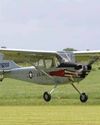
Legend Hobby 13-Foot L-19 Bird Dog/ Cessna O-1
This famous multi-mission single engine observation aircraft served from 1950-1974. From calling out target locations to providing intel/recon information, the Bird Dog was a valued asset in both the Korean War and Vietnam.
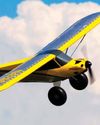
EARN YOUR WINGS
10 Tips for First-Flight Success
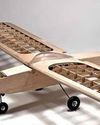
Old School Model Works Fifty Six
The Fifty Six takes its design cues from the original .09- to .15-size Carl Goldberg Falcon 56 of the 1960s. Reworked to incorporate modern, lasercut techniques to make kit building better than ever.
FLYING TWINS Multi-engine warbirds made easy
Let’s face it, there’s just something extra special about twin-engine RC aircraft. Most modelers stop what they’re doing when a twin fires up on the flightline.
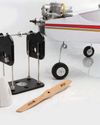
HOW TO BALANCE PROPELLERS
Four easy steps to increase performance and reduce vibration
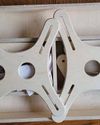
PRODUCT REVIEW: RC PLANE STANDS BENCHTOP MODEL
I’m a sucker for shop stuff. I buy tools I will probably never use just because they are cool, or I might need to use them someday. When Glen from RC Plane Stands reached out about a review, however, I knew as soon as I browsed their website that I would be receiving something I would use a lot, maybe even daily.
SPIRIT OF RHINEBECK AWARD WINNER
A close up of Norman Malinowski’s 1/3-scale Albatros
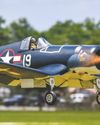
CENTER OF GRAVITY BASICS
The secret to a plane that flies well